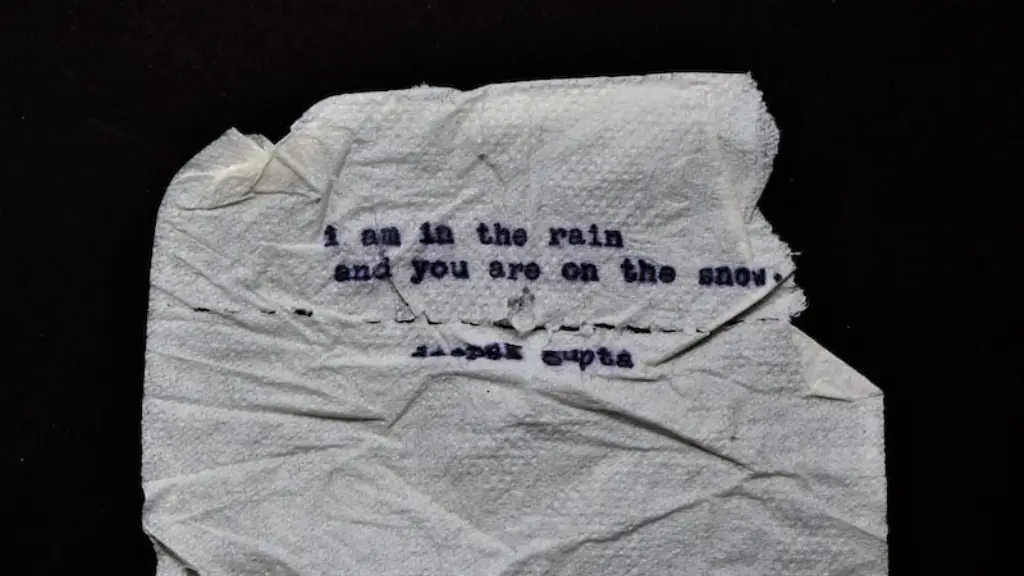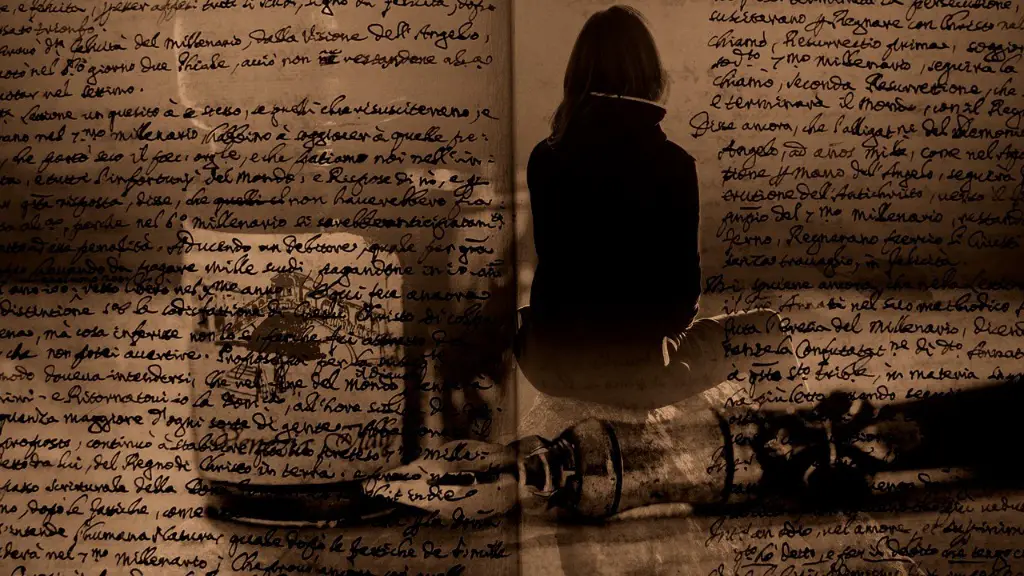Why is Word Choice Important in Poetry?
Word choice is a critical aspect of any art form, but it is especially important when writing poetry. When it comes to eloquent communication, not just any word will do. In difficult or complex topics, the right word choice can make the difference between having a good or a great poem. This is because the poet must be able to find the right words to convey the feelings of their subject to the listener or reader.
An important part of writing effective poetry is choosing the right words that best suit the tone and context of the poem. For example, if a poem is about love, then using words like “devotion” or “passion” will be more effective than words like “excitement” or “happiness”. Additionally, when the poet chooses to use more specific words, it will add a touch of elegance and authenticity to the poem that would otherwise be hard to achieve.
In addition to accurately conveying the emotion of the poem, word choice can also be used to influence how the poem is interpreted. The words chosen by the poet can paint a vivid picture in the reader’s mind and give them a better understanding of the atmosphere of the poem. For example, if the poet is trying to describe a dark, cold winter street, then the words they choose could evoke the feeling of loneliness and despair, rather than of comfort and peace.
Also, words have the power to establish a connection with the reader, which can help to engage and captivate them. The best poets know how to create a bond between themselves and their readers by using words that are relatable, tangible and evocative. In doing so, they can create an intimate and powerful reading experience that allows the reader to truly get lost in the poem.
Furthermore, the occasional use of alliteration, rhyme and repetition can help to give a poem greater clarity and flow. All these tools contribute to the richness of the poem and can be used strategically to get an idea across. The output of this technique is often much more impactful and memorable than if the poet had just used plain and simple words.
Overall, word choice plays a fundamental role in poetry. It is what gives the poem its true power, by allowing the poet to accurately convey their emotions and thoughts. It also allows the poet to create a unique and lasting impression on their reader, as well as adding style and complexity to the poem. Therefore, when writing poetry, it is essential for the poet to take their time in selecting the most suitable words for their poem.
What Are Poetic Devices?
Poetic devices are tools that a poet can use to convey a certain feeling or to create an effect. These devices can include similes, metaphors, personification, alliteration, and many more. The use of poetic devices is important as they can help the poet to add beauty to their poem by making it more vivid and meaningful. Additionally, they are a great way to emphasize certain points or feelings that the poet wants to make.
Similes, for instance, are a great way to compare two completely different things, making the poem more interesting and engaging. Metaphors, on the other hand, are used to describe something by comparing it to something else without using the words ‘like’ or ‘as’. Personification, which is the act of attributing human characteristics to non-living things or abstract concepts, is also a popular poetic device.
Another device that is commonly used in poetry is alliteration. This is the repetition of the initial consonant sounds of two or more words within a phrase or sentence. Alliteration adds a musical quality to the poem and provides a powerful emphasis to the words being used. It is also used to create rhythm and structure to the poem, making it easier to remember and easier to recite.
Overall, the use of poetic devices can heighten the impact of a poem and make the reading experience more enjoyable for the reader. They are also helpful in conveying deeper meanings and emotions, as well as bringing a sense of clarity to the poem.
How Can Word Choice Help Make a Poem More Interesting?
When it comes to writing a poem, there are a few things that the poet can do to ensure that their poem stands out as unique and interesting. One of the best ways to make a poem interesting is to use clever and creative word choice. It is important to not just rely on the same words that everyone else is using, but to come up with new and unexpected words to express ideas.
Using synonyms and antonyms can be a great way to find words with deeper and more interesting meanings. These words can help to give a poem more color, as well as some extra depth and complexity. Additionally, the poet should also stay away from cliches and try to come up with their own original turns of phrase.
Moreover, making use of unfamiliar words from different languages can add a unique and exotic touch to the poem. For example, if the poem is about love, then using words like ‘amour’ or ‘saudade’ can bring a whole new layer to the poem.
Overall, by using out of the ordinary words with unique meanings, the poet can convey thoughts and feelings in a way that may have otherwise been impossible. Thus, creative and interesting word choice is an essential part of writing a great poem.
What Are Some Characteristics of Good Word Choice?
In order to make sure that the words chosen are best suited for the poem, certain criteria must be considered when selecting words. The best words are those that are specific, vivid and emotive. This is because they will bring a depth of expression to the poem.
Furthermore, the chosen words must also be concise and appropriate for the subject matter. For instance, if the poem is about a gloomy day, then “depressing” would be a better word choice than “sorrowful”. Lastly, the words must flow naturally, as if it was the only way the poem could be expressed.
Therefore, when choosing words for a poem, the poet should consider the emotion they want to convey, the imagery that the words should create in the reader’s mind, and the accuracy and relevance of the words to the rest of the poem. Doing so will ensure that the words chosen are the best suited for the poem.
How Do Poets Choose the Right Words?
Word choice is an important aspect of any poem, and a poet must choose the right words to accurately convey a message. The process of choosing the right words for a poem can be challenging, but it is essential for the poem’s success. There are several tips that can help a poet to choose the words that best fit their poem.
Firstly, it is important for the poet to take their time and think carefully about the words they are using. Searching through thesauruses can provide great insight into the many different ways that a particular feeling can be expressed. Additionally, reading other poems and studying words can help the poet to get a better understanding of how certain words can evoke certain emotions.
Also, it is important to not be afraid to experiment. Trying out different words and seeing how they sound can give the poet a better idea of which ones are the most suitable. Lastly, discussing the poem with others can also be helpful in finding out which words fit the poem best. Doing so can provide the poet with different perspectives to consider when selecting words.
What Are Some Tips for Re-Writing a Poem?
Poems don’t always come out perfectly on the first go. In fact, the process of writing a poem is usually a long and arduous one and often requires several drafts before it is finished. Fortunately, re-writing a poem is not a difficult task, so long as the poet knows what to focus on.
The most important aspect of re-writing a poem is checking for consistency and flow. The poet should make sure that transitions between lines are smooth and that the poem contains a clear message. Another important element to consider is the imagery and metaphors that are used. It is important to ensure that the images are vivid and that they accurately capture the emotion of the poem.
The poet should also pay attention to the language they are using. This includes the length of words and the rhythm of the poem. Making sure that the words fit naturally into the rhythm of the poem will create a more convincing and enjoyable reading experience. Additionally, the poet should also revise the poem for any grammar or spelling errors.
Overall, the task of re-writing a poem can be daunting but by understanding what needs to be done and taking the necessary steps, the process can be made a lot easier.





